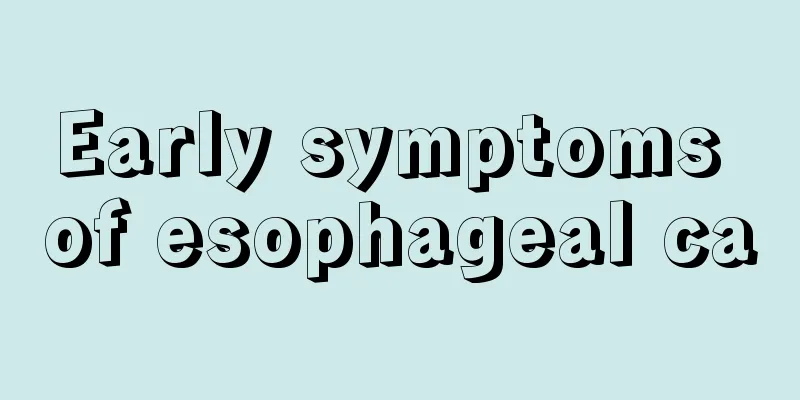Early symptoms of esophageal ca

|
What are the early symptoms of esophageal CA? Esophageal CA is a strange name, but to put it simply, esophageal CA is actually esophageal cancer. The incidence of esophageal cancer is very high among cancers, so it is very common. In fact, many people may not know that they have esophageal cancer. The reason is that they do not understand the symptoms of esophageal cancer and ignore the symptoms, which leads to cancer. So what are the early symptoms of esophageal CA? 1. Early days Symptoms are often not obvious, but there may be varying degrees of discomfort when swallowing rough and hard food, including a choking sensation when swallowing food, burning, pricking, or pulling and rubbing pain behind the sternum. Food passes slowly, and there is a sense of stagnation or foreign body sensation. The choking and stagnation sensation is often relieved and disappears after swallowing water. Symptoms vary in severity and progress slowly. 2. Middle and late stages The typical symptom of esophageal cancer is progressive dysphagia, which first makes it difficult to swallow dry food, then semi-fluid food, and finally water and saliva. Patients often spit out mucous sputum, which is the saliva and esophageal secretions that are swallowed. Patients gradually lose weight, become dehydrated, and become weak. Continuous chest pain or back pain indicates that it is a late-stage symptom, and the cancer has invaded the tissues outside the esophagus. When the inflammatory edema caused by the cancer obstruction temporarily subsides, or part of the cancer falls off, the obstruction symptoms can be temporarily alleviated, which is often mistaken for improvement. If the cancer invades the recurrent laryngeal nerve, hoarseness may occur; if it compresses the cervical sympathetic ganglion, Horner syndrome may occur; if it invades the trachea or bronchi, esophageal, tracheal or bronchial fistulas may form, causing severe coughing when swallowing water or food, and respiratory infections. Finally, cachexia may occur. If there is metastasis to organs such as the liver and brain, jaundice, abdominal effusion, coma, etc. may occur. During the physical examination, special attention should be paid to whether there are enlarged lymph nodes on the clavicle, whether there are masses in the liver, and whether there are abdominal effusions, pleural effusions and other distant metastatic signs. |
<<: How to Treat Esophageal Adenocarcinoma
>>: Famous hospital for breast cancer treatment
Recommend
Is microneedling effective in removing acne scars?
Acne scars bring troubles to many people. Not onl...
Does putting belly button stickers on babies with diarrhea work?
All babies will have diarrhea, which can be divid...
Will I get tetanus if I get stabbed by a rusty nail?
When walking on the road, some people do not pay ...
What are the benefits of eating bananas during menstruation?
Many female friends will experience symptoms such...
Can drinking soy milk really help you sober up?
We all know that eating some soy products regular...
What are the symptoms of stomach injury
We often hear people say that drinking alcohol hu...
Why do my palms keep peeling?
There are many reasons why the palms of your hand...
The efficacy and function of Huanglong Jade
22. Nowadays, many people like to buy Huanglong j...
How long can you live with frontal bone cancer
How long can you live with frontal bone cancer? B...
Experts talk about the clinical manifestations of pancreatic cancer.
Pancreatic cancer has a great impact and harm on ...
Is prostate cancer hereditary?
Considering that there are more and more patients...
What is the reason for the dull pain in the right upper abdomen and back pain
If you have dull pain in the upper abdomen and ba...
We should take the prevention of rectal cancer seriously
Rectal cancer has a great impact on the human bod...
What are the ways that colorectal cancer spreads?
Colorectal cancer can spread through: (1) Direct ...
What are the complications of closed skull fractures
Some friends may not understand the concept of cl...









